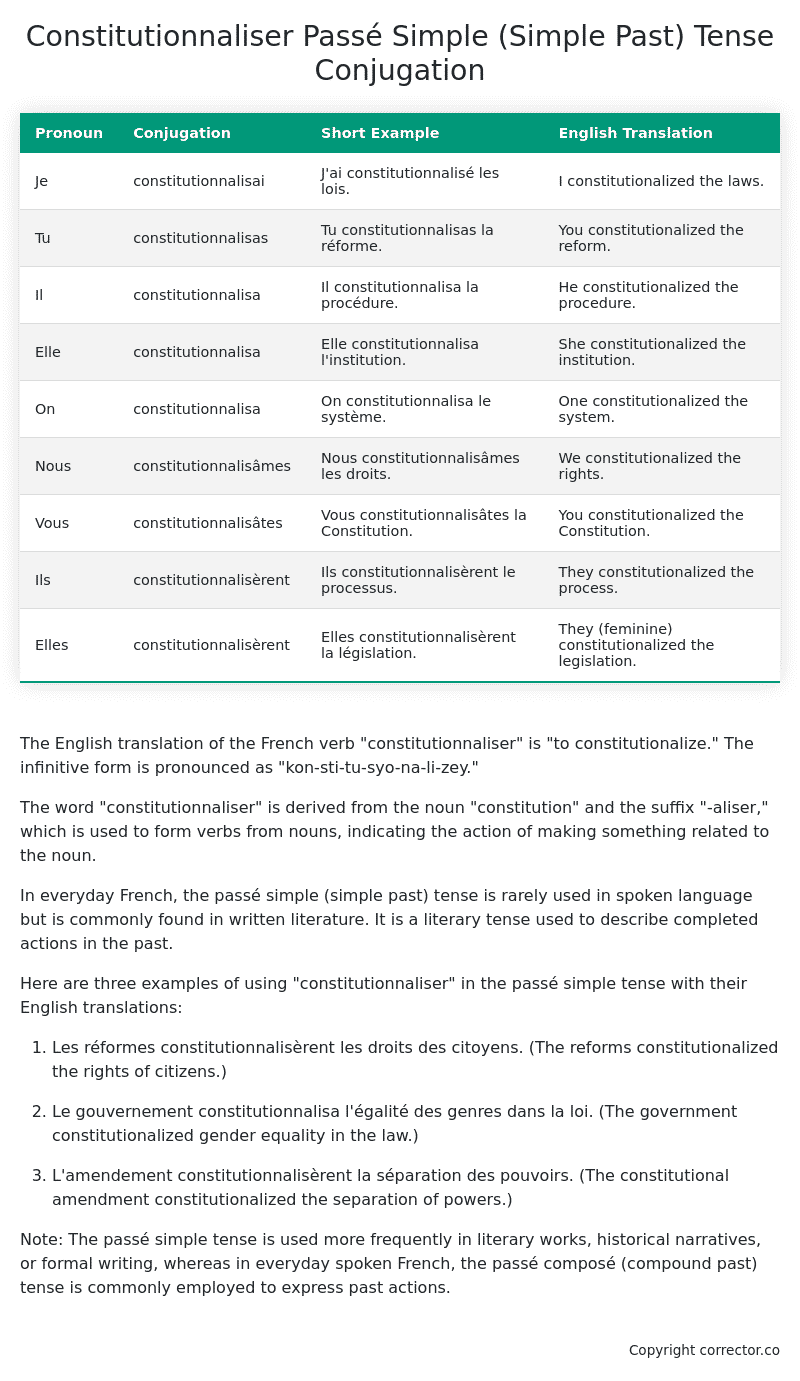Passé Simple (Simple Past) Tense Conjugation of the French Verb constitutionnaliser
Introduction to the verb constitutionnaliser
The English translation of the French verb “constitutionnaliser” is “to constitutionalize.” The infinitive form is pronounced as “kon-sti-tu-syo-na-li-zey.”
The word “constitutionnaliser” is derived from the noun “constitution” and the suffix “-aliser,” which is used to form verbs from nouns, indicating the action of making something related to the noun.
In everyday French, the passé simple (simple past) tense is rarely used in spoken language but is commonly found in written literature. It is a literary tense used to describe completed actions in the past.
Here are three examples of using “constitutionnaliser” in the passé simple tense with their English translations:
-
Les réformes constitutionnalisèrent les droits des citoyens.
(The reforms constitutionalized the rights of citizens.) -
Le gouvernement constitutionnalisa l’égalité des genres dans la loi.
(The government constitutionalized gender equality in the law.) -
L’amendement constitutionnalisèrent la séparation des pouvoirs.
(The constitutional amendment constitutionalized the separation of powers.)
Note: The passé simple tense is used more frequently in literary works, historical narratives, or formal writing, whereas in everyday spoken French, the passé composé (compound past) tense is commonly employed to express past actions.
Table of the Passé Simple (Simple Past) Tense Conjugation of constitutionnaliser
| Pronoun | Conjugation | Short Example | English Translation |
|---|---|---|---|
| Je | constitutionnalisai | J’ai constitutionnalisé les lois. | I constitutionalized the laws. |
| Tu | constitutionnalisas | Tu constitutionnalisas la réforme. | You constitutionalized the reform. |
| Il | constitutionnalisa | Il constitutionnalisa la procédure. | He constitutionalized the procedure. |
| Elle | constitutionnalisa | Elle constitutionnalisa l’institution. | She constitutionalized the institution. |
| On | constitutionnalisa | On constitutionnalisa le système. | One constitutionalized the system. |
| Nous | constitutionnalisâmes | Nous constitutionnalisâmes les droits. | We constitutionalized the rights. |
| Vous | constitutionnalisâtes | Vous constitutionnalisâtes la Constitution. | You constitutionalized the Constitution. |
| Ils | constitutionnalisèrent | Ils constitutionnalisèrent le processus. | They constitutionalized the process. |
| Elles | constitutionnalisèrent | Elles constitutionnalisèrent la législation. | They (feminine) constitutionalized the legislation. |
Other Conjugations for Constitutionnaliser.
Le Present (Present Tense) Conjugation of the French Verb constitutionnaliser
Imparfait (Imperfect) Tense Conjugation of the French Verb constitutionnaliser
Passé Simple (Simple Past) Tense Conjugation of the French Verb constitutionnaliser (You’re reading it right now!)
Passé Composé (Present Perfect) Tense Conjugation of the French Verb constitutionnaliser
Futur Simple (Simple Future) Tense Conjugation of the French Verb constitutionnaliser
Futur Proche (Near Future) Tense Conjugation of the French Verb constitutionnaliser
Plus-que-parfait (Pluperfect) Tense Conjugation of the French Verb constitutionnaliser
Passé Antérieur (Past Anterior) Tense Conjugation of the French Verb constitutionnaliser
Futur Antérieur (Future Anterior) Tense Conjugation of the French Verb constitutionnaliser
Subjonctif Présent (Subjunctive Present) Tense Conjugation of the French Verb constitutionnaliser
Subjonctif Passé (Subjunctive Past) Tense Conjugation of the French Verb constitutionnaliser
Conditionnel Présent (Conditional Present) Tense Conjugation of the French Verb constitutionnaliser
Conditionnel Passé (Conditional Past) Tense Conjugation of the French Verb constitutionnaliser
Conditionnel Passé II (Conditional Past II) Tense Conjugation of the French Verb constitutionnaliser
L’impératif Présent (Imperative Present) Tense Conjugation of the French Verb constitutionnaliser
L’impératif Passé (Imperative Past) Tense Conjugation of the French Verb constitutionnaliser
L’infinitif Présent (Infinitive Present) Tense Conjugation of the French Verb constitutionnaliser
L’infinitif Passé (Infinitive Past) Tense Conjugation of the French Verb constitutionnaliser
Le Participe Présent (Present Participle) Tense Conjugation of the French Verb constitutionnaliser
Le Participe Passé (Past Participle) Tense Conjugation of the French Verb constitutionnaliser
Struggling with French verbs or the language in general? Why not use our free French Grammar Checker – no registration required!
Get a FREE Download Study Sheet of this Conjugation 🔥
Simply right click the image below, click “save image” and get your free reference for the constitutionnaliser Passé Simple tense conjugation!

Constitutionnaliser – About the French Passé Simple (Simple Past) Tense
Formation
Usage
Narration
Historical Context
Interactions with other tenses
Passé Composé
Imparfait
Conditional and Subjunctive
Summary
I hope you enjoyed this article on the verb constitutionnaliser. Still in a learning mood? Check out another TOTALLY random French verb conjugation!


